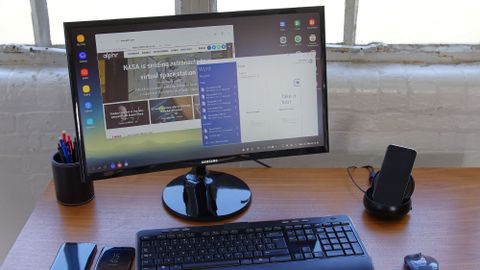CloudPro Verdict
Pros
- +
Fast performance; Simple setup; Strong list of compatible apps
Cons
- -
Galaxy S8 required; Only supports one external monitor
Enterprise tech firms have been trying for years to sell us on the idea of one device which can function as the only work technology you'll need, rolling a laptop, desktop and smartphone into one. This has historically been a bit of a pipe dream, with disappointing technology that over-promises and under-delivers.
Until now.
Meet the Samsung DeX - it may not look like much, but chances are this little box could happily replace virtually every business device you own. Together with the Galaxy S8, DeX (short for desktop experience) is Samsung's attempt to provide a genuine all-in-one business device, and it's pretty impressive.
The DeX unit itself is basically just a simple docking station; it's the S8 that provides the brains of the operation, doing most of the heavy lifting in terms of compute power. What DeX brings to the table is a healthy complement of ports, including USB-C, HDMI, Ethernet and two USB 2.0 ports, allowing the S8 to be hooked up to a monitor, mouse, keyboard and wired internet connection.
In theory, this means that you can simply slot the S8 into its housing and immediately start using it just as you would a normal desktop PC - but we've heard those sorts of promises before, only to be let down by barely-usable performance and technical limitations.
Thankfully, these concerns are nowhere to be seen with DeX. Slide the S8 into the dock, and it'll immediately launch a desktop environment reminiscent of Google's Chrome OS - which is appropriate, since it uses a modified version of Android. Navigating through menus, launching apps and general use is all as speedy as it would be with a mid-range laptop, with no discernible slowdown compared to the S8's excellent regular speeds.
It supports common interactions like multiple resizable windows, drag and drop and right-click menus, and it even works with keyboard shortcuts for tasks like copying, pasting and window snapping. In practise, it really does feel all but identical to using a standard desktop computer, though DeX does only support one external monitor, a bit of a downside for those who like working across multiple screens.
App support is also superb. Certain popular apps have been specially formatted for use DeX, including Google apps like Gmail, YouTube and Chrome, as well as more sophisticated business applications like Microsoft's Office apps and Adobe's photo editing tools. On top of all this, DeX is compatible with desktop virtualisation solutions like Citrix Receiver, Amazon WorkSpaces and VMware Horizon Client.
This is a strong suite of business applications, and combined with Samsung's Knox security and management tools, makes a compelling case for DeX as a legitimate enterprise tool. The potential cost savings from deploying DeX are enormous - if your organisation typically outfits its employees with both a company-issue smartphone and a PC, DeX allows you to combine both of these expenses into one with minimal compromise on performance and functionality.
Indeed, you may actually find that your agility and productivity improves when using DeX. Being able to seamlessly switch between mobile and desktop uses means that you can take all of your work files, contacts and applications with you at a moment's notice - if you have to suddenly dash out to a meeting, just grab the S8 from its cradle, and you'll bring all the relevant data with you in your pocket.
It may seem hard to believe, but for the vast majority of business needs, the Galaxy S8 and DeX really can replace all your existing client IT. Move over, laptop - we've got the power of a PC in our pocket.
Verdict
Together with the Galaxy S8, Samsung's DeX system is a mobile device that can genuinely do it all. With nippy performance, a strong business app ecosystem and unbeatable mobility, DeX may well be the future of workplace tech.
Adam Shepherd has been a technology journalist since 2015, covering everything from cloud storage and security, to smartphones and servers. Over the course of his career, he’s seen the spread of 5G, the growing ubiquity of wireless devices, and the start of the connected revolution. He’s also been to more trade shows and technology conferences than he cares to count.
Adam is an avid follower of the latest hardware innovations, and he is never happier than when tinkering with complex network configurations, or exploring a new Linux distro. He was also previously a co-host on the ITPro Podcast, where he was often found ranting about his love of strange gadgets, his disdain for Windows Mobile, and everything in between.
You can find Adam tweeting about enterprise technology (or more often bad jokes) @AdamShepherUK.
Most Popular

By Simon Handby

